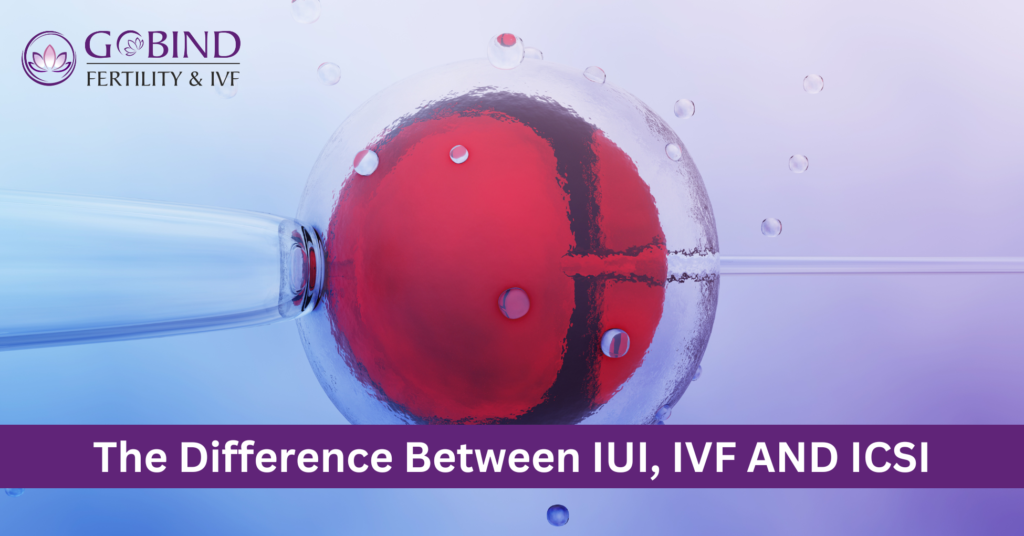The Difference Between IUI, IVF AND ICSI

IUI, IVF and ICSI are different types of ARTs (assisted reproductive technologies) used to help individuals or couples conceive.
Assisted Reproductive Technology refers to a series of medical treatments and procedures that assist people in being parents when they have difficulties conceiving naturally. Within the prepared technology, an egg and sperm cell meet and form an embryo that can develop into a baby.
IUI: Intrauterine Insemination
1) The woman may be given fertility medications to assist her in producing one or more eggs.
2) Ovulation study for eggs is done when follicle size reaches 19-20mm and endometrial lining also matures, injection for the ripening of the follicle is given to the female and IUI is planned between 28 hrs to 34 hrs.
3) On the day of the procedure, the male gives a semen sample. This sample undergoes a semen wash procedure and healthy and active sperms are collected in 0.4ml to 0.5ml pallets.
4) This sperm sample is taken into a cannula and inserted into the uterus of the female through the cervical canal when she releases an egg during the ovulation period.
5) It would increase the chances of fertilization because it brings sperm closer to eggs which should be achieved through this procedure.
6) Unlike IVF, IUI is simple and cost-effective.
7) The overall success rate of IUI is 10% to 15%.
IVF: In Vitro Fertilization
1) A woman takes injections to produce multiple eggs in the ovaries.
2) The doctor monitors the growth of eggs through ultrasounds and blood tests; it takes 9 to 10 days to mature the eggs. When the size of the follicles reaches 17mm to 18mm injection for their ripening is given. These eggs are collected after 34 hrs to 36hrs under ultrasound guidance through the vagina with a needle.
3) On the same day male gives a semen sample which undergoes washing and healthy sperm are collected.
4) Eggs and sperm are mixed in the lab for fertilization in the incubator. There are two methods of fertilization – Conventional IVF and ICSI.
5) The embryos grow in the incubator for 3 to 5 days.
6) At the time of embryo transfer endometrial lining is prepared between 12 to 19 days and then the embryo is transferred under ultrasound guidance at a proper place.
7) Pregnancy test is done after 14 days of embryo transfer.
ICSI (Intracytoplasmic Sperm Injection)
1) The steps involved in egg retrieval and sperm collection remain the same as in IVF.
2) It is not just putting eggs together with sperms but rather, a single sperm is picked up using a tiny pipette.
3) Using a high-powered microscope, this single sperm can be directly injected into each egg individually.
4) The ICSI procedure is very helpful when sperm count is very low, thus making fertilization possible.
5) These fertilized eggs are cultured and then transferred into the woman’s womb just like IVF.
6) ICSI can sometimes be used when prior IVF cycles have failed or in cases of serious male factor infertility among others.
To sum up, Intrauterine insemination (IUI) involves a basic technique that aids in bringing together sperm and eggs while delineating this; In Vitro Fertilization (IVF), refers to getting eggs out of a woman’s body and mixing them with sperm in the petri dish and keeping in an incubator, formed embryos are transferred into the uterus at a proper time. To have a successful IVF Journey, contact Gobind Fertility & IVF Centre.
ICSI is an advanced stage of IVF where every single sperm cell has been injected into each ovum, this process is fruitful for severe male infertility.
